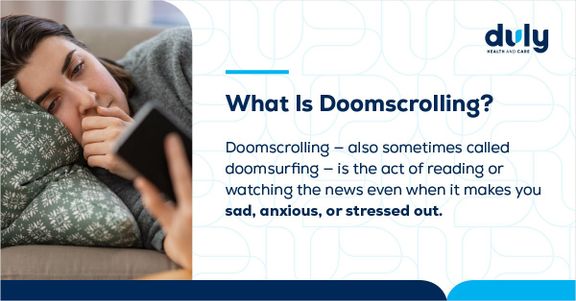You wake up in the morning to read about news from around the world. It makes you sad and stressed, and yet you can’t seem to stop reading. Before you know it, 30 minutes have passed and you feel awful.
If this sounds like you, you may have a habit of “doomscrolling.”

Stress is a part of life, but when you find that certain habits — like reading or watching the news — are making the stress in your life worse, it might be time for a change. While getting distracted by bad news is pretty easy these days, it’s not impossible to adopt strategies that protect your mental health instead.
Set time limits for your news exposure.
Just like you might set a time limit on how long a child can watch TV, practice setting boundaries with yourself when it comes to exposure of news or social media.
Try limiting your news consumption to 30 minutes a day, or utilize the tools on your phone to set a screen limit. If you find yourself constantly going back to social media on your work break, try going for a walk or calling a friend instead.
Other strategies to help you preserve your mental health while also staying informed about what’s going on in the world around you include:
Reading more than just the headlines. Headlines are designed to get your attention and an emotional response. Reading the full article can provide context, and you may find the news is actually much less stressful than the headline suggests.
Monitor your news sources. Just like good food helps you maintain a healthy diet, reputable news sources help you maintain a healthy news diet, too. Watch out for news that can be designed to make you reactive.
Get involved. It can be stressful to see issues in your community, and it’s easy to feel helpless. There are many positive ways you can donate your time, talent, or money to support the causes you read and care about.
While it might be tempting to read or watch as much news as you can to stay informed, this can quickly lead to burnout and stress or even depression and anxiety.
Ask for help — even when it’s hard.
If reading the news is stressing you out, you might think it’s all on you to destress. This thought, and other common myths about mental health therapy, keep many people from asking for help when they need it.
Duly Health and Care provides a range of mental and behavioral health support to help you feel your best. If you are feeling anxious or depressed, getting support is as easy as contacting your primary care provider.
Your Duly provider can:
Help you talk through your emotions, feelings, and behaviors and how they impact your day-to-day life
Share coping strategies for managing feelings of anxiety, depression, or stress
Connect you with additional resources or referrals to address your unique needs and goals
You don’t have to manage your mental health all by yourself. If you want to feel your best and develop health strategies that make life easier, reach out to your Duly primary care provider today.
Practice shifting into a more positive mindset.
While having coffee with a friend, have you found yourself talking about world events? Suddenly, your happy hangout has turned into a spiral of gloom.
Creating space to talk about challenging topics is important, and it can be a good way to feel like you aren’t the only one seeing them. But it can also lead you and your friend to have an unhealthy relationship when focusing on negative feelings.
While you might not have control over all of the bad things happening in the world, you do have control over a conversation like this. Sometimes, protecting your mental health — and building positive coping skills — is as easy as saying, “I think we’re focusing too much on the bad news. Would it be okay to talk about something more positive?”
One way to shift into a more mindful place is with conversation starters that focus on the negative, positive, and the upcoming. With this, you ask everyone to come up with one example for each of these questions:
What’s one thing that’s been challenging you lately?
What’s something exciting or good that’s happened to you recently?
What’s one thing that you’re excited about?
This kind of mindful reflection can be done on your own, with a friend, or with a group. When you find yourself getting too deep into current events, a shift in mindset might be just what you need.
Take a step back and look to the future.
Just by reading these strategies, you’ve taken an important step toward breaking the habit of doomscrolling and making healthier news-reading habits.
These might seem like small changes, but they can have a big impact on your mental health. By being more intentional about how you use social media and how you get your news, you can build a better outlook and develop coping skills you can carry throughout your whole life.
Health Topics:








